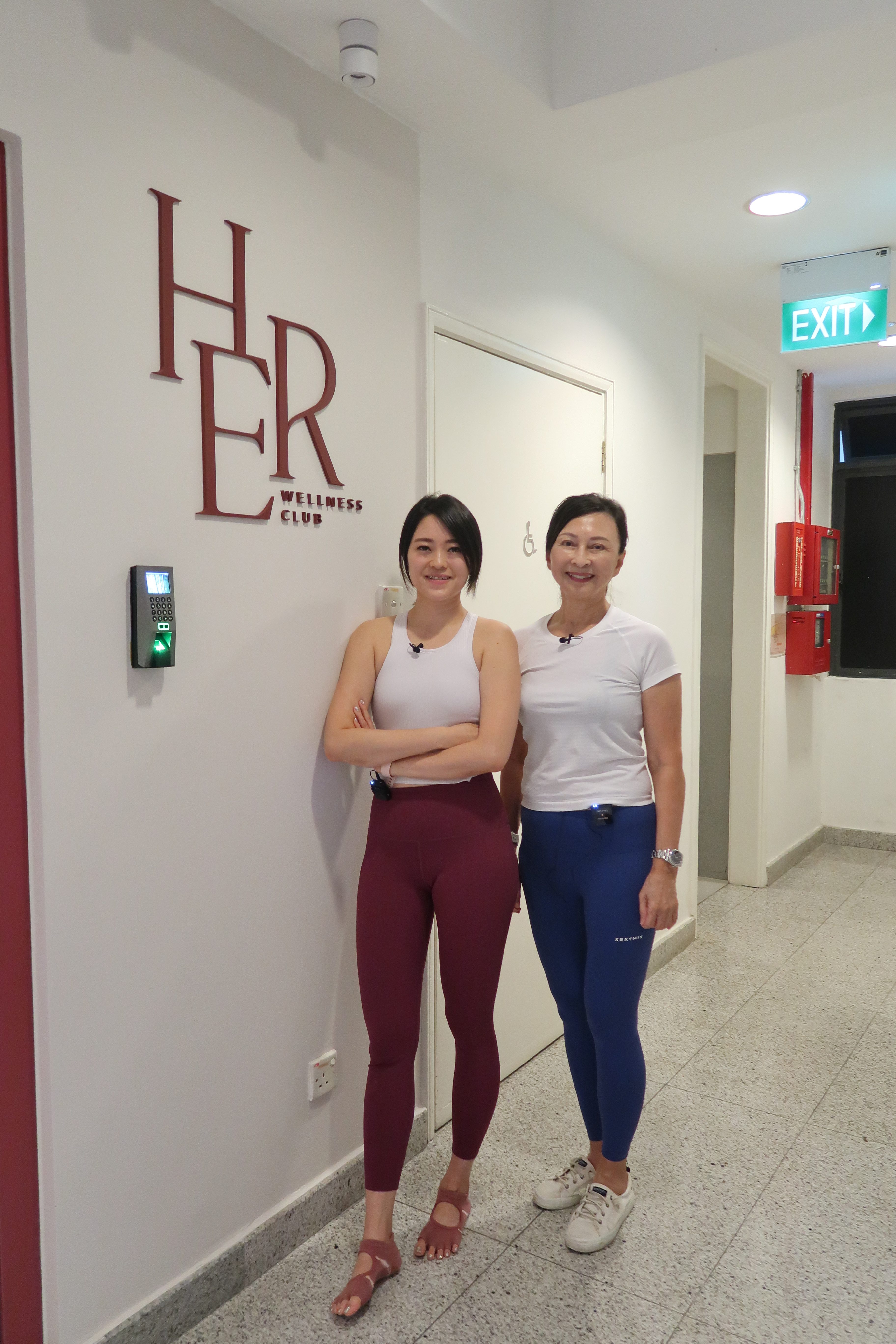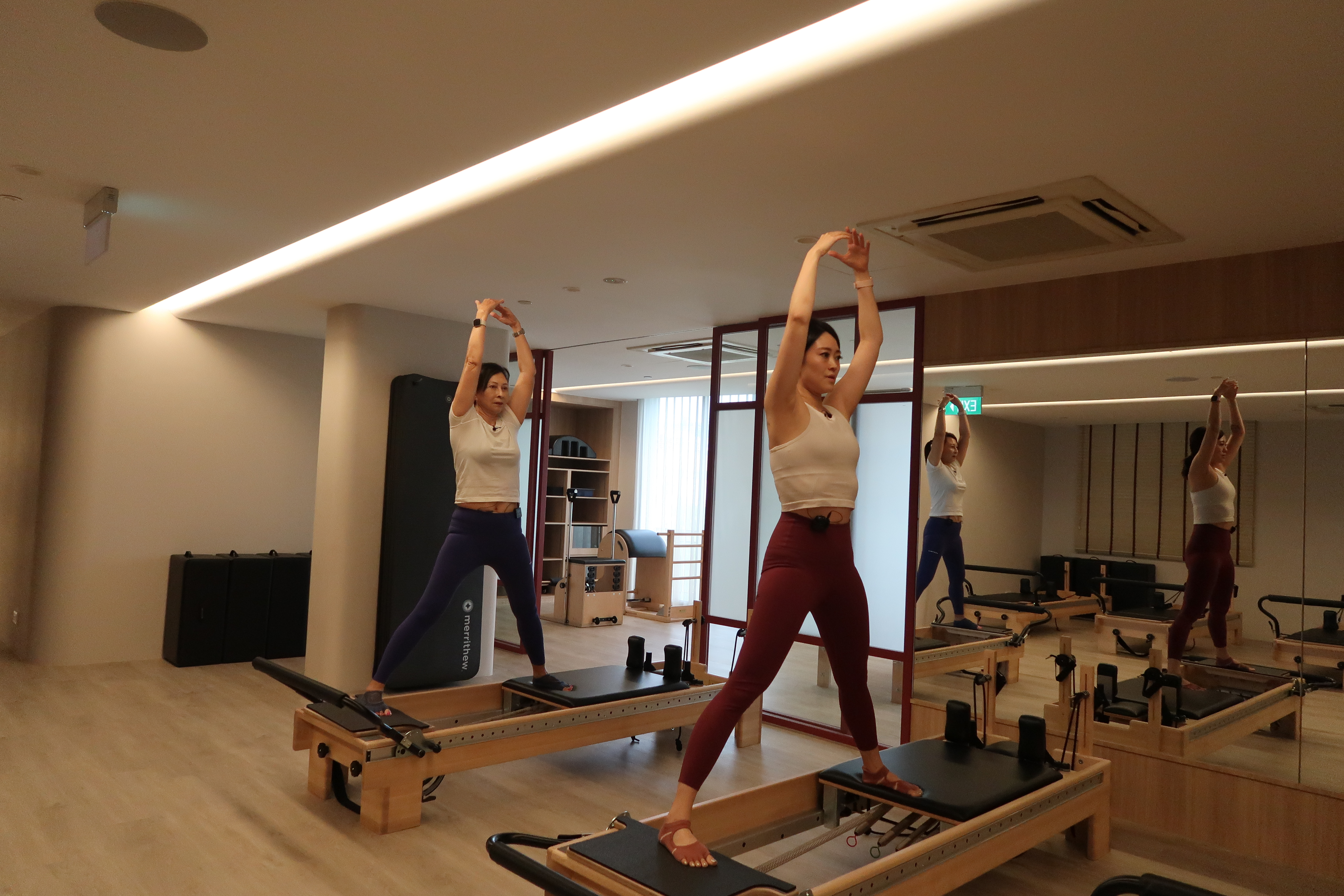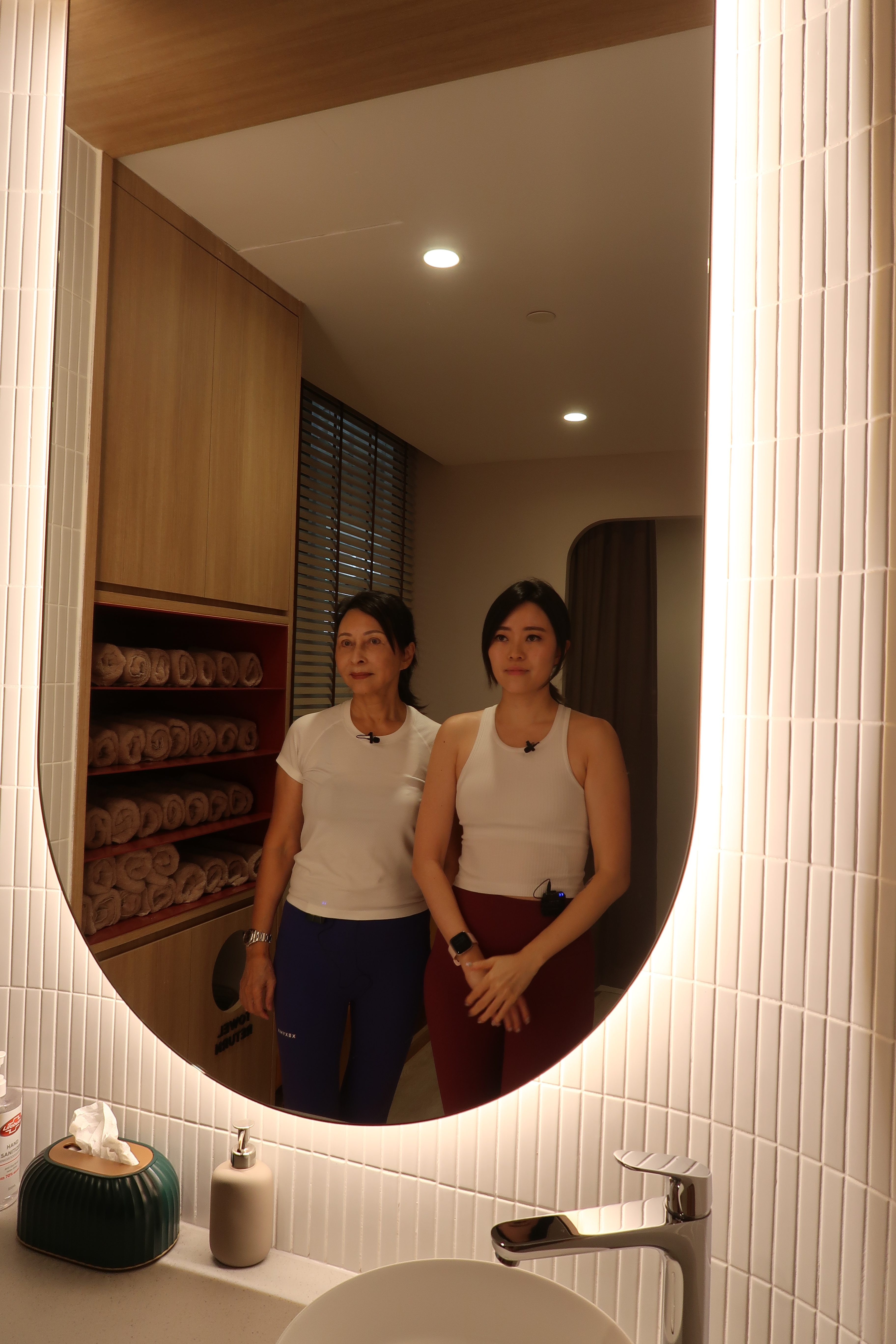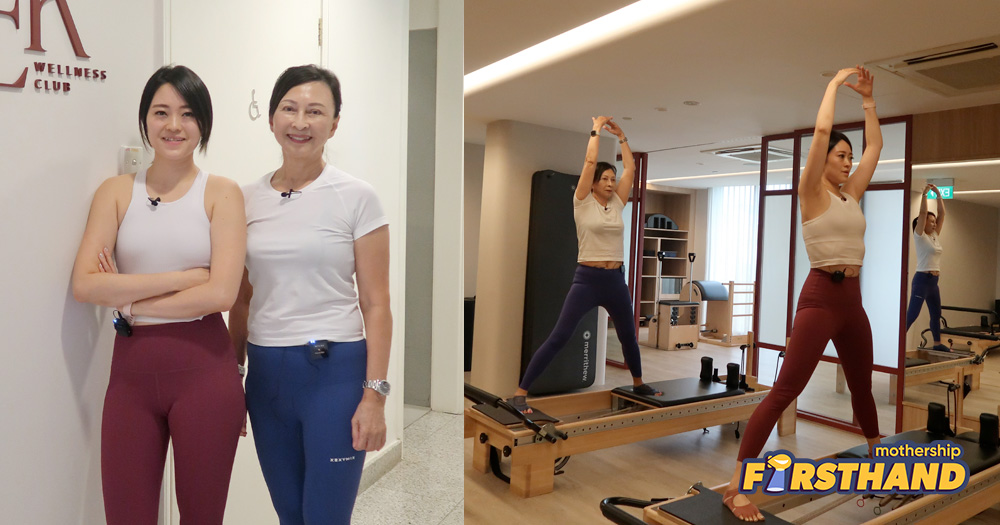We all wear a bunch of different masks. The way you talk to your grandma is different than how you’d talk to your best friend, which is different again from the way you might speak to a colleague, and the opposite of how you’d try chat up the new barista.
But what happens when these lines are blurred?
Pek Li Jun, 37, and Cheo Hock Kuan, 69, have found out.
Recently, the pair started a business together.
They’re also mother and daughter.
The business
There was a lot of love in the room when I met Pek and her mother.
Before our interview, Cheo, who’s no stranger to interviews after her previous position as CEO of a major Singaporean company, leaned over to her daughter and — without prompting — helped clip on her microphone.
She told me Pek was the “main character” in the interview and she would just chime in every now and then.
Pek has always looked up to her mother, especially when it comes to business.
But it was clear throughout our time together that it’s a two-way street and Cheo is full of admiration for her business-savvy daughter, too.
The business in question is Her Wellness Club, a new Pilates studio targeted at women set to open its doors on Feb. 1.
 Image by Alfie Kwa
Image by Alfie Kwa
Pek is the new mother of a toddler, and Cheo is a retiree.
Between the both of them, they have lived experiences of what they call the “different phases of a woman’s life”, including childbirth, motherhood, and menopause.
Why Pilates?
But why Pilates, and why wellness?
Cheo started Pilates first. She was looking for the best way to “keep going, still look graceful, and feel good about herself”, so her gynaecologist recommended Pilates.
That was 15 years ago and “there was no turning back”.
Pek noted the difference she saw in her mother’s fitness:
“I guess it just really impressed me how much it had changed her life and her movement.”
When the pair first started attending classes together in 2016, Pek was quickly humbled by her mum’s vigour.
At first Pek remembered thinking that she must have been much fitter that her mum. But once they started, it was the younger of the pair that found themselves “dying” during difficult sets, while Cheo was “quite chill”.
Eventually they both found that Pilates was something universal; Cheo could enjoy it just as much as her daughter.
Not only this, but it’s fun, challenging, and makes them feel good.
More importantly, the duo — having firsthand experience with the milestones of motherhood, working motherhood, and menopause — are passionate about wellness in women.
“Women are very busy; they juggle multiple roles. Very often, they take care of everybody and then there's very little left for themselves.
But we want this to be a space where all these women who are doing all these things, and taking care of all these people, can come.”
A welcoming place
When I walked into HER Wellness Club in Orchard, the first thing I noticed was the smell. "Smells really good in here lol," I texted my colleague.
Not only that, it felt very peaceful — which was exactly what the duo had in mind when designing it.
The natural light, the soft colours, the family-style kitchen, the comfy couch, the co-working space; the space is homely, yet practical. The pair wanted it to be “functional as well as aesthetic”, and Pek considers the ambience important for those regularly visiting.
 Image by Alfie Kwa
Image by Alfie Kwa
 Image by Alfie Kwa
Image by Alfie Kwa
It's not just a Pilates studio. With the understanding that wellness is more than just plain exercise, they also focus on mindfulness and nutrition.
To those ends, they have also other services such as weekly guided meditation classes and workshops, as well as a private kitchen where healthy dishes are served.
The Club is for women, by women.
Importantly, it is for all women, regardless of what stage they’re at in their lives; whether “prenatal, postnatal…working women, working mums, peri-menopausal, menopausal”, or anything in between.
Working together
They'd been working together awhile, but I was curious — would they recommend opening a mother-daughter business to anyone else?
“Yes,” Cheo replied straight away, before expectantly turning to her daughter. There was a beat. “She didn’t [reply] straight away,” said Cheo, laughing.
Then Pek told anecdotes about her friends who have “complicated relationships” with their own mothers, before saying, “It definitely makes me feel that even when I'm working, I'm actually spending time with one of the most important people in my life.”
“That was a very considered response,” replied her mum.
Despite her mother's lighthearted jab, Pek told me how she’s “always looked up to” her mother, that she is her “role model”, her “best friend”, and the first person she would ask advice from.
 The two women in their Pilates studio in Orchard. Photo by Alfie Kwan
The two women in their Pilates studio in Orchard. Photo by Alfie Kwan
Outside of wholeheartedly believing in the concept, a driver for the business was spending more time with each other.
And their relationship is stronger because of it.
Business partners have hiccups, it’s the nature of the beast.
But Cheo told me arguments are a “necessary evil”.
Over the past six months, most disagreements have stemmed from the pair’s differing career backgrounds.
Cheo comes from the commercial world and spent the last five years before retirement as CEO of Temasek Trust. Therefore, the ideas she has differ greatly from daughter's, who comes from a marketing background.
For Pek, a self-described “creative”, she likes working at her own pace, only reporting to her team when necessary. On the other hand, Cheo likes “regular updates” to ensure everyone’s on the same page.
Adapting has been an important part of the process, as it is in most business relationships. But the difference here is that it’s trickier to find the off switch, especially for Cheo.
She told me that at family dinners she would try to discuss work, but Pek would stop her and postpone the conversation. Boundaries became important, needing to draw the line between family and business.
The whole experience was a huge learning curve through which their understanding of the other has grown — “both the good and the bad”.
For instance, Pek saw her mother's business side for the first time.
She said:
“Now I know that she actually has a very good memory because she would always...forget, like, birthdays and occasions and be like, ‘Oh, I have a very bad memory, you know?’, [or] ‘I don't pay attention to details’.
But now… every day she's like, ‘Oh, the sales are like this’ and... she has all these numbers in her head. So, I'm like, ‘Oh, so you have the capacity to do that but just not for personal things’.”
Meanwhile, Cheo has learned a lot from and about her daughter throughout the process, namely “patience”. She told me:
“I always appreciate very much her strengths. Of course, I don't like some of her shortcomings, but there's also a way to bring about changes in myself, how I look at things.”
The beauty about arguments within families is that, when dealt with appropriately, it can build up a family business rather than tear it apart. That's exactly happened with this particular duo.
For both women, one of the highlights of the journey thus far has been spending meaningful time with the other.
Wellness costs
Wellness has been a growing business in recent years. A 2022 report suggested the global industry was worth US$5.6 trillion (almost S$7.5 trillion), up 14% from 2019.
But the biggest obstacle for tackling wellness isn’t the lack of services available, it’s the sheer cost of it.
In Singapore, Pilates classes average S$65 per class, which is significantly more than the S$2.50 it costs to enter some gyms.
Mindfulness is priced similarly per session, and dietitians are typically only available to those in hospital or with some level of disposable income.
While it is undoubtedly beautiful and empowering, Her Wellness Club is part of this wider trend — that wellness is a privilege reserved for those who can pay for it.
After all, it is a member's only space. Its “boutique approach” means there will be approximately 100 members.
The intimacy of this means classes — both group and private — can be more tailored to fit individuals’ needs and capabilities.
But at the same time, this means that it inevitably will be open to a relatively narrow sliver of society.
The future
For its flaws, it's clear that Her Wellness Club is a passion project by two women who sincerely want to make things better.
It is fuelled by a love of women, wellness, and most importantly — each other.
Watching the two of them, I couldn't help but think of my own mum, living 6,300km away from Singapore. Seeing the unbridled love between Cheo Hock Kuan and Pek Li Jun made me miss her.
Cheo hopes this is just the beginning, a “pilot project”.
Who knows, if it goes well, maybe there’ll be scope to grow the business into something a wider cross-section of women, of all ages and backgrounds, can access.
I really hope so.
Top photo by Alfie Kwa.

If you like what you read, follow us on Facebook, Instagram, Twitter and Telegram to get the latest updates.



